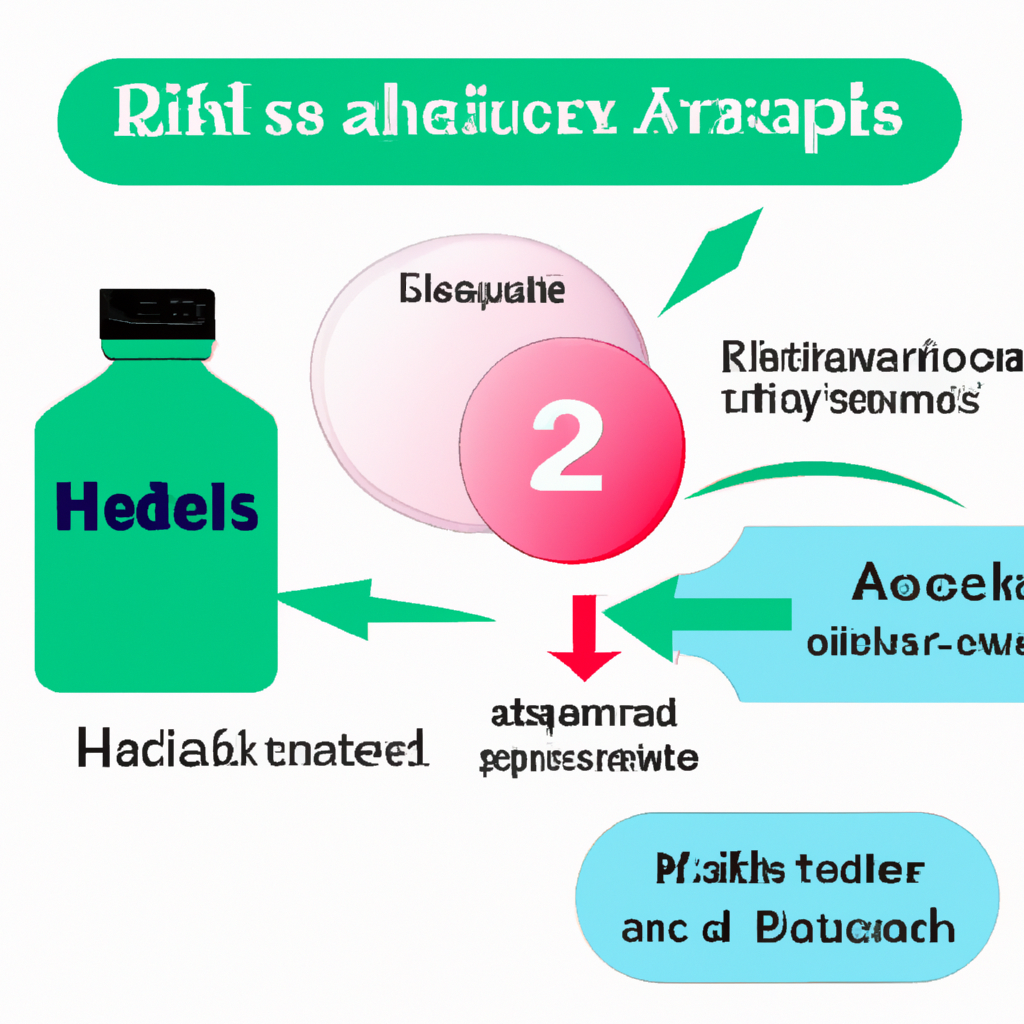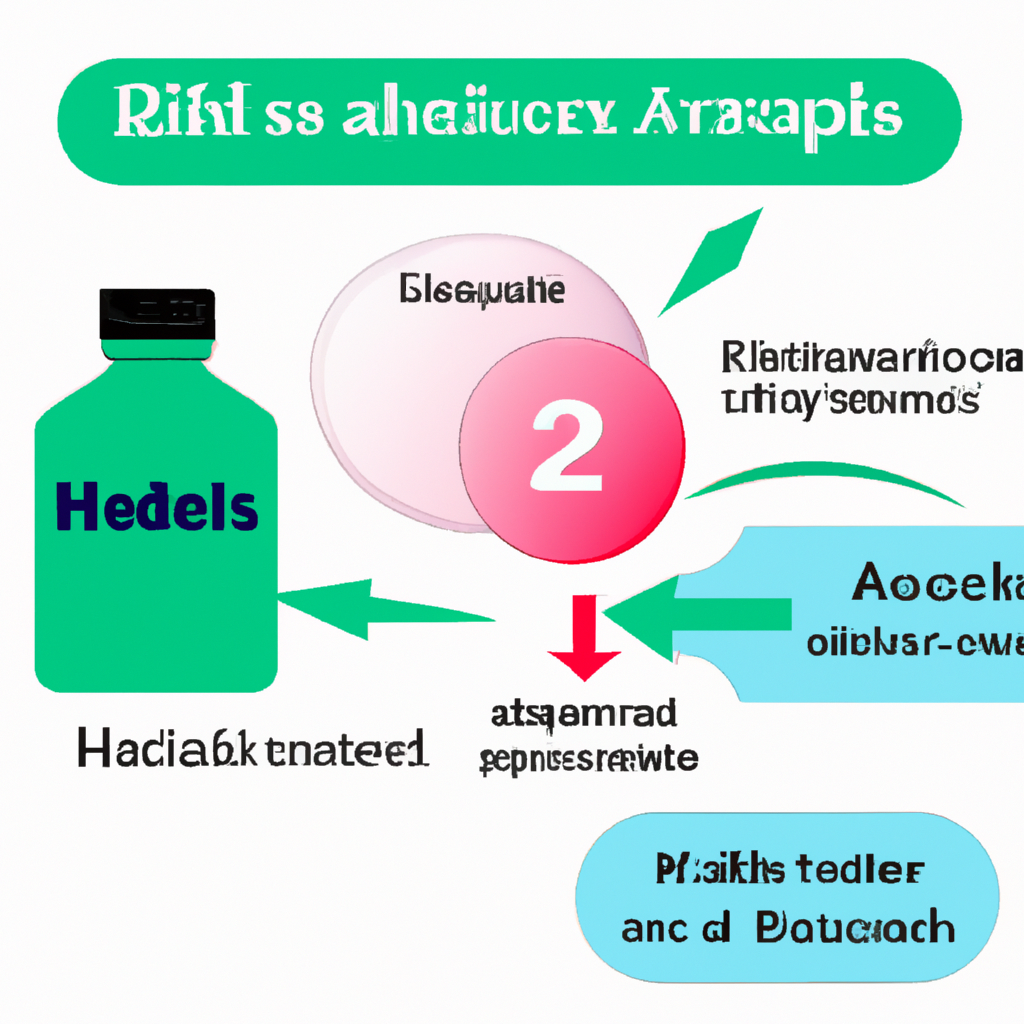If you’ve ever experienced the painful symptoms of acid reflux, you understand the discomfort it can bring to your everyday life. Thankfully, there is a solution that can provide much-needed relief: H2 blockers. In this article, we’ll uncover the essentials of H2 blockers for acid reflux, shedding light on what you really need to know. From understanding how they work to their potential benefits and side effects, we’ve got you covered. So, say goodbye to those unpleasant sensations and let’s dive into the world of H2 blockers together. You’ll be amazed at how these little tablets can make such a big difference in your wellbeing.
What is Acid Reflux?
Acid reflux, also known as gastroesophageal reflux disease (GERD), is a chronic condition where stomach acid flows back into the esophagus. This occurs when the lower esophageal sphincter (LES), a ring of muscle that acts as a valve between the stomach and the esophagus, doesn’t close properly. The backward flow of stomach acid can cause a range of uncomfortable symptoms and may lead to damage to the lining of the esophagus. It is a common condition that affects millions of people worldwide.
Definition of acid reflux
Acid reflux refers to the regurgitation of stomach acid into the esophagus, resulting in symptoms such as heartburn, chest pain, and regurgitation of sour or bitter-tasting acid. It is important to differentiate occasional acid reflux from chronic GERD, as the latter may require long-term management and treatment.
Causes of acid reflux
Several factors can contribute to the development of acid reflux. These include:
- Weakness or dysfunction of the lower esophageal sphincter (LES), allowing stomach acid to flow back into the esophagus.
- Hiatal hernia, where a portion of the stomach protrudes through the diaphragm, creating an opening for acid reflux.
- Obesity, which increases pressure on the abdomen and can push stomach contents upward.
- Certain foods and beverages, such as spicy or fatty foods, citrus fruits, coffee, and alcohol, that can trigger episodes of acid reflux.
- Smoking, as it weakens the LES and increases acid production.
- Pregnancy, which can cause hormonal fluctuations and increased abdominal pressure, leading to acid reflux.
Symptoms of acid reflux
Symptoms of acid reflux can vary in intensity and frequency, but commonly include:
- Heartburn: a burning sensation in the chest that may radiate to the throat.
- Regurgitation: the backflow of sour or bitter-tasting acid into the mouth or throat.
- Chest pain: discomfort or pressure in the chest area that can mimic heart-related issues.
- Difficulty swallowing: feeling as though food is getting stuck in the esophagus.
- Persistent cough: a chronic cough that may worsen after lying down or eating.
- Hoarseness: a raspy or rough voice, often due to irritation of the vocal cords.
If you experience frequent or severe symptoms of acid reflux, it is important to consult with a healthcare professional for an accurate diagnosis and appropriate treatment.
Understanding H2 Blockers
What are H2 blockers?
H2 blockers, also known as H2 receptor antagonists, are a type of medication commonly used to manage acid reflux symptoms. They work by blocking histamine receptors in the stomach, reducing the production of stomach acid. By decreasing acid production, H2 blockers provide relief from heartburn and other symptoms associated with acid reflux.
How do H2 blockers work?
H2 blockers inhibit the action of histamine, which is a chemical responsible for triggering the release of stomach acid. By blocking the histamine receptors in the stomach, H2 blockers reduce the production of acid by the cells lining the stomach wall. This helps to alleviate the symptoms of acid reflux and promote the healing of the esophagus.
Different types of H2 blockers
There are several H2 blockers available on the market, including:
- Ranitidine (Zantac)
- Famotidine (Pepcid)
- Cimetidine (Tagamet)
- Nizatidine (Axid)
Each medication may vary in terms of dosage, duration of action, and potential side effects. It is important to consult with a healthcare professional to determine the most appropriate H2 blocker for your specific needs.

Efficacy of H2 Blockers
Effectiveness of H2 blockers
H2 blockers have been proven to be effective in providing relief from acid reflux symptoms. They can help reduce the frequency and severity of heartburn, regurgitation, and other associated symptoms. In many cases, H2 blockers can provide significant improvement in quality of life for individuals suffering from acid reflux.
Comparison with other acid reflux medications
While H2 blockers are effective for many individuals, they may not be suitable for everyone. In some cases, proton pump inhibitors (PPIs) may be more appropriate for managing acid reflux symptoms. PPIs work by reducing the production of stomach acid on a more profound level than H2 blockers. However, H2 blockers are generally considered a safer option for short-term or intermittent use.
Usage and Dosage
How to use H2 blockers
H2 blockers are typically taken orally in the form of tablets or capsules. It is important to follow the instructions provided by the healthcare professional or the medication label when using H2 blockers. They are usually taken before meals or at bedtime to maximize their effectiveness in reducing stomach acid production.
Recommended dosage
The recommended dosage of H2 blockers may vary depending on the specific medication and the severity of the individual’s acid reflux symptoms. It is important to consult with a healthcare professional to determine the appropriate dosage for your situation. Following the prescribed dosage and schedule is key to achieving optimal therapeutic outcomes.
Precautions and possible side effects
While generally well-tolerated, H2 blockers may have some potential side effects. These can include headache, dizziness, diarrhea, and constipation. In rare cases, more serious side effects such as liver problems or allergic reactions may occur. It is important to be aware of these potential side effects and consult with a healthcare professional if any concerns arise.

Benefits and Risks of H2 Blockers
Advantages of using H2 blockers
H2 blockers offer several advantages in the management of acid reflux symptoms. These include:
- Effective symptom relief: H2 blockers can provide relief from heartburn, regurgitation, and other symptoms associated with acid reflux.
- Accessibility: Many H2 blockers are available both over-the-counter and with a prescription, making them easily accessible for individuals seeking relief from acid reflux symptoms.
- Safety profile: H2 blockers are generally safe for short-term or intermittent use, with lower incidences of long-term side effects compared to other acid reflux medications.
Potential risks and drawbacks
While H2 blockers can be effective for many individuals, they may not be suitable for everyone or for long-term use in severe cases of acid reflux. Some potential risks and drawbacks of H2 blockers include:
- Limited acid suppression: H2 blockers may not provide sufficient acid suppression for individuals with severe or chronic acid reflux.
- Potential side effects: While generally well-tolerated, H2 blockers can have side effects such as headache, dizziness, and gastrointestinal disturbances.
- Drug interactions: H2 blockers may interact with certain medications, including anticoagulants and antiarrhythmic drugs. It is important to consult with a healthcare professional to ensure safe and appropriate use of H2 blockers.
Combining H2 Blockers with other Treatments
Combining H2 blockers with lifestyle changes
In addition to medication, lifestyle modifications can play a crucial role in managing acid reflux symptoms. It is often recommended to make dietary changes, such as avoiding trigger foods, eating smaller meals, and avoiding lying down immediately after eating. Elevating the head of the bed and quitting smoking can also help reduce acid reflux symptoms. When used in conjunction with H2 blockers, these lifestyle changes can provide additional relief and improve overall outcomes.
H2 blockers and antacids
Antacids are another type of medication commonly used for treating acid reflux. They work by neutralizing stomach acid, providing immediate relief from symptoms. H2 blockers can be used in combination with antacids for enhanced symptom relief. The antacids provide rapid relief, while the H2 blockers address the underlying cause of acid reflux by reducing acid production.
H2 blockers and proton pump inhibitors (PPIs)
In some cases, individuals with severe or persistent acid reflux may require a stronger medication like a proton pump inhibitor (PPI). PPIs work by blocking the enzyme responsible for acid production in the stomach, providing long-lasting acid suppression. H2 blockers can be used as a short-term solution while waiting for the full effects of PPIs to kick in or as an intermittent treatment option for managing milder symptoms.
H2 Blockers vs. Proton Pump Inhibitors
Differences between H2 blockers and PPIs
H2 blockers and proton pump inhibitors (PPIs) are both commonly used for managing acid reflux symptoms but work in different ways. H2 blockers reduce the production of stomach acid by blocking histamine receptors, while PPIs inhibit the enzyme responsible for acid production in the stomach. PPIs provide more profound and long-lasting acid suppression compared to H2 blockers.
When to consider PPIs over H2 blockers
PPIs are generally recommended for individuals with severe or persistent acid reflux symptoms that are not adequately controlled with H2 blockers. Additionally, PPIs may be more suitable for individuals with certain underlying medical conditions or those who require long-term acid suppression. It is best to discuss with a healthcare professional to determine whether PPIs or H2 blockers are the appropriate choice for managing your acid reflux.
Common Brands and Availability
Popular H2 blocker brands
Some popular H2 blocker brands include Zantac, Pepcid, Tagamet, and Axid. These medications are available in different strengths and forms, including tablets, capsules, and liquids. It is important to consult with a healthcare professional or pharmacist to determine the most suitable brand and formulation for your needs.
Prescription vs. over-the-counter H2 blockers
Many H2 blockers are available over-the-counter, allowing individuals to access relief without a prescription. However, some brands and higher strengths may require a prescription. It is important to follow the recommended dosage and consult with a healthcare professional if symptoms persist or worsen.
Availability in different countries
H2 blockers are widely available in pharmacies and drugstores across various countries. However, the specific brands and formulations may vary. It is best to consult with a healthcare professional or local pharmacist to ensure the availability of H2 blockers in your country or region.
Consulting a Healthcare Professional
Seeking medical advice before using H2 blockers
Before starting H2 blocker therapy, it is always recommended to consult with a healthcare professional. They can assess your specific symptoms, medical history, and potential drug interactions to determine the most appropriate treatment plan.
Discussing potential drug interactions with a doctor
H2 blockers may interact with certain medications, including blood thinners, anticoagulants, and certain heart medications. It is crucial to discuss your current medications and any potential drug interactions with a healthcare professional before starting H2 blocker therapy.
Alternative Acid Reflux Treatments
Exploring alternative treatments for acid reflux
While H2 blockers are commonly used for acid reflux management, there are also alternative treatments available that may provide relief for some individuals. These can include:
- Lifestyle modifications: Making dietary changes, losing weight, and avoiding triggers can help alleviate acid reflux symptoms.
- Herbal remedies: Certain herbs, such as chamomile, ginger, and licorice, have been traditionally used to soothe the digestive system and may offer relief from acid reflux.
- Acupuncture: Some individuals find acupuncture helpful in managing acid reflux symptoms by promoting relaxation and balancing energy flow.
- Stress reduction techniques: Stress can exacerbate acid reflux symptoms. Techniques like meditation, yoga, and deep breathing exercises can help reduce stress and potentially alleviate symptoms.
It is important to note that the effectiveness of alternative treatments may vary, and consulting with a healthcare professional is advisable to determine the most appropriate treatment options for your individual needs.
In conclusion, H2 blockers are a commonly used medication for managing acid reflux symptoms. They work by reducing the production of stomach acid and providing relief from symptoms such as heartburn and regurgitation. While generally safe and effective, it is important to consult with a healthcare professional before starting H2 blocker therapy to ensure its suitability for your specific situation. Lifestyle modifications and alternative treatments can also play a significant role in managing acid reflux and can be used in conjunction with H2 blockers for enhanced symptom relief. By understanding the benefits, risks, and available options, you can make informed decisions about managing your acid reflux and improve your overall quality of life.
